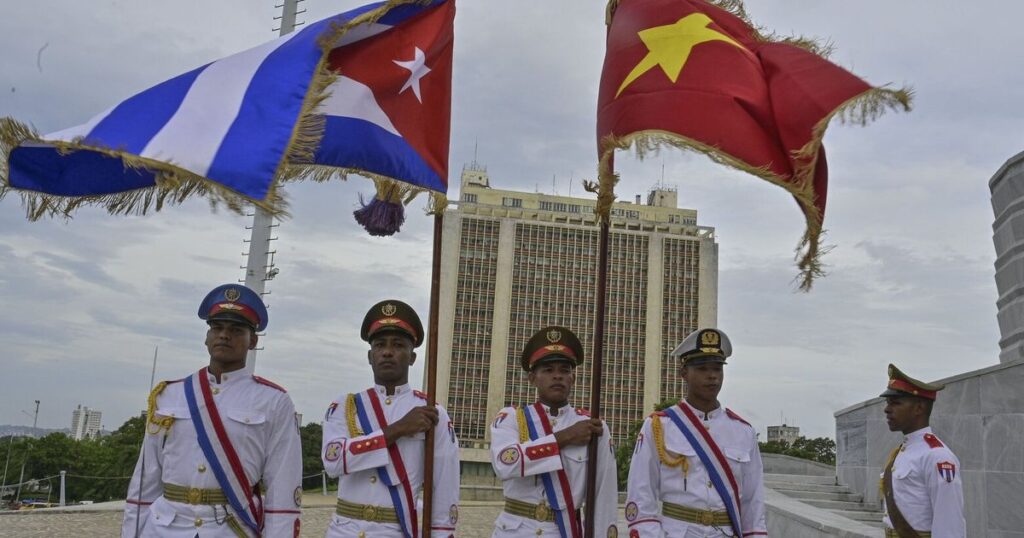HO CHI MINH CITY, Vietnam — Dinh Hien Mo was skimming social media Sunday at her home in central Vietnam when she stumbled on a post calling for aid to Cuba, where hunger has been spreading as inflation soars.
She watched videos and read about how Cuba supported Vietnam during the wars of the 1960s and ’70s, building hospitals and sending doctors, sugar and cattle. Inspired, she donated 500,000 Vietnamese dong (about $19) from the modest income she earns at her family’s grocery store.
“I feel bad that people in Cuba are suffering from economic hardship,” she said. “They’re isolated by sanctions and their economy is cut off from the world — Vietnam used to be like that, but we opened up, and life here is much better.”
Her donation joined a chain-reaction of generosity. A new crowdfunding campaign for Cuba led by the Central Committee of the Vietnam Red Cross Society has raised more than $13 million in the first week — far more than organizers had expected for the entire two-month effort.
And with that unexpected surge has come a complex reckoning. For many in Cuba and Vietnam, the charitable transfers bring up memories of past solidarity, when both nations shared dreams of communist independence won through revolution. But there’s also the awkward realization that their roles have reversed because of choices made as the Cold War ended.
Vietnam, when faced with shortages and starvation, pivoted quickly toward free enterprise in the mid-’80s, leading to restored relations with the United States in 1995, and a manufacturing and agricultural boom that has nearly erased extreme poverty.
Cuba stuck with ideology and one-man rule. The island nation, which had an unequal but developed economy roughly on par with Argentina’s in the 1950s, remained in the intransigent grip of Fidel Castro until his death in 2016. Even after President Barack Obama visited Cuba, seeking to end decades of hostility, Castro, his brother Raúl, and their handpicked successors maintained strict state control of the economy.
A U.S. trade embargo had been limiting Cuba’s options since 1962. Compounding that challenge, Cuba’s leaders failed to empower the country’s well-educated population. From 1999 to 2016, the best that most Cubans could do was start small restaurants or other home-based businesses that the government harassed with high taxes and hefty regulations.
Vietnamese economists — the architects of the country’s success story — frequently traveled to Havana throughout this period, offering guidance and lectures. They said that many of their presentations drawing on what worked well in Vietnam, like letting people start small businesses without permits, were kept secret by Cuban officials.
“They didn’t want to implement the freedom to do business,” said Le Dang Doanh, the former head of Vietnam’s Central Institute for Economic Management.
Today, Cuba is on its knees. Tourism never recovered from the pandemic. Facing tougher enforcement of the embargo from Washington, everything seems to be breaking down at once.
Blackouts have spread because of a decaying power grid and a lack of fuel. Consumer prices have risen fourfold over the past five years, according to experts, spurring migration and putting already-scarce food and medicine beyond the reach of many workers.
Even the infant mortality rate, which Cuba’s leaders had proudly brought to levels lower than the United States, has been rising.
“Cuba is in very bad shape,” said Carlos Alzugaray, an analyst and former Cuban diplomat in Havana. “And those who are in power don’t seem to know what to do either because they are ignorant, or inept, or corrupt, or don’t care or because they are terrified about losing control if they go too far in opening up.”
Vietnam, while supporting Cuba’s call for the United States to drop its embargo, has become even more determined to help. Most of the rice that Cubans receive through government rations are donations from Vietnam. Last year, To Lam, Vietnam’s top leader, visited the island and promised closer ties.
The crowdfunding campaign, which aims to celebrate the 65th year of diplomatic relations between the two countries, represents a more emotional step of people-to-people connection. It has attracted more than 1.7 million donations, mostly from 38 cents (10,000 dong) to $38.
Miguel Díaz-Canel Bermúdez, the president of Cuba, posted a public thank you note on the social platform X over the weekend, expressing gratitude for “an act of love” that comes from “a hardworking and heroic people who were able to rise up after several wars and today dazzle the world with their sustained progress.”
He did not say how Vietnam’s money would be used.
Some Vietnamese critics online said it made no sense to support leaders who have made the Cuban people poor. Donors said they just hoped the cash transfers would get to the people in need.
“I know the support from Vietnam won’t be enough to solve everything, but I hope it helps in some way,” said Mo, 33. “And I hope their economy will get better so people there can have better lives.”

